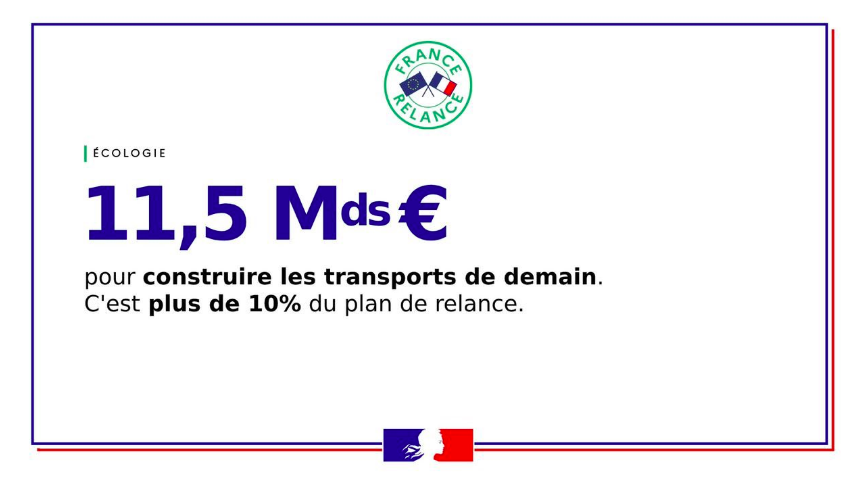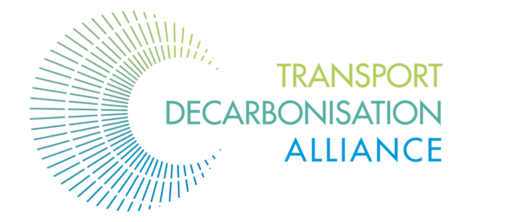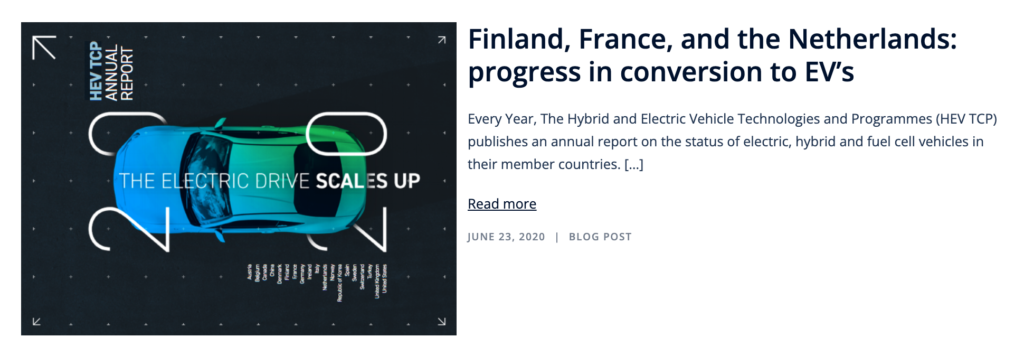TARGETS AND ACTIONS ON TRANSPORT DECARBONISATION
In 2019, France passed the Law on Energy and Climate to introduce the objective of carbon neutrality by 2050 and lower the country’s carbon emissions as part of its commitment to the 2015 Paris Agreement.
The National low carbon strategy was updated in 2020, taking into account this new objective of carbon neutrality by 2050. This objective implies a division of greenhouse gas emissions on French territory of more than 6 compared to 1990. The ambition is therefore raised in comparison to the first strategy, which aimed at the “factor 4”, i.e. a 75% reduction of its GHG emissions by 2050 compared to 1990.
In response to the economic impact of the current health crisis (COVID-19 pandemic), the French government presented a recovery plan in which green transition is crucial. To this end, transport decarbonisation is a key measure of the plan with 11.5 billion euros devoted to it. This amount will enable the greening of daily mobility through support for active mobility such as cycling, but also by developing multimodal transport solutions allowed by the growth of the rail network. Financial support will additionally promote the green conversion of the vehicle fleet and contribute in greening ports. In the upcoming years, investment will also be made in research and development enabling the preparation of future generations of aircraft (ultra-low energy consumption and/or switch to hydrogen as a primary energy source) and of future vehicles: connected, decarbonised and manufactured in France.
In addition, France is supporting the growth in the use of EVs on its territory: infrastructures will be adapted to this new zero-emission mode of transport with the aim of a total of 100,000 publicly accessible charging points by the end of 2021.The French goal is to ban the sale of passenger cars using carbon-based fossil fuels by 2040.
BEST PRACTICES
- The “Assises nationales de la Mobilité” is a participatory and open approach that was carried out in 2017 to identify the needs and priorities for the transport policy. It was used to prepare the orientation Law on mobility and accelerate the sector’s ecological transition.
- Bonus schemes keep on supporting demand for low and very low emission vehicles.
- Low- or zero-emission vehicles will replace 64,000 vehicles belonging to the French government’s fleet.
- The implementation of the “Coup de Pouce vélo” programme enables French people to repair their bikes and relearn how to use them in cities as a real mode of transportation.
- Launched in 2018, the “French Mobility” (France Mobilité) platform supports new solutions and innovations to facilitate mobility and reduce dependency on individual car use. By bringing together mobility stakeholders and easing experience sharing within the “French mobility” community, the platform facilitates experimentation of innovative mobility solutions, for all and in all territories, and particularly in rural and peri-urban areas.
FRANCE'S GREEN RECOVERY PLAN ON DECARBONISING TRANSPORT
In response to the economic impact of the current health crisis, the government of France presented on 3 September a 100 billion euro recovery plan to support economic activity and bolster job creation.
Ecological transition is one of the three pillars of the recovery plan – with 30 billion euros dedicated to green investments in France, which aims to become Europe’s largest carbon-free economy. To this end, transport decarbonisation is a key measure of the plan.
Read more about the plan here.

WORKING PAPER: STEERING A GREEN, HEALTHY AND INCLUSIVE RECOVERY THROUGH TRANSPORT
In response to the economic impact of the current health crisis, the government of France presented on 3 September a 100 billion euro recovery plan to support economic activity and bolster job creation.
Ecological transition is one of the three pillars of the recovery plan – with 30 billion euros dedicated to green investments in France, which aims to become Europe’s largest carbon-free economy. To this end, transport decarbonisation is a key measure of the plan.
Read more about the plan here.
UPDATES
FURTHER INFORMATION
- À votre service
- Climate Plan
- EU First NDC (English Version)
- EU First NDC (English Updated Version)
- EU First NDC (French Version)
- EU First NDC (French Updated Version)
- Mobilités et territoires
- Rouler en électrique : la mobilité du futur s’écrit aujourd’hui !
- Stratégie Nationale Bas-Carbone (SNBC)
- The Paris Agreement
- Transport ferroviaire
- Transport fluvial, mer et ports
- Transport routier
- Véhicules
CONNECT WITH US AT THE TDA!








